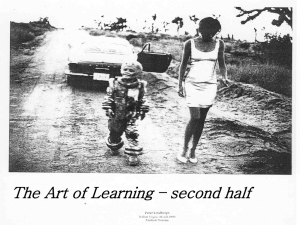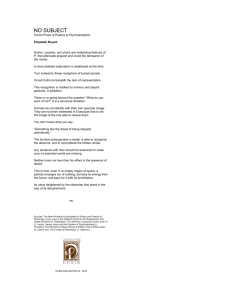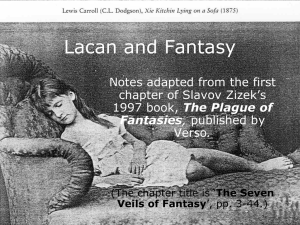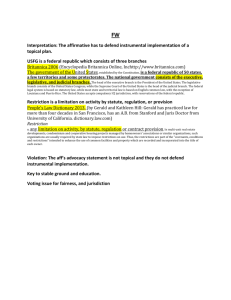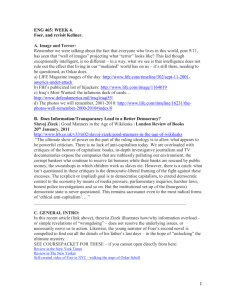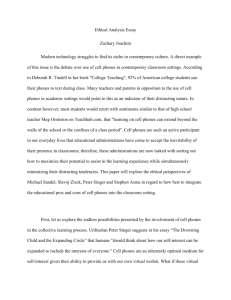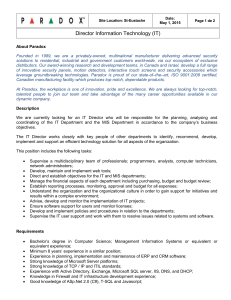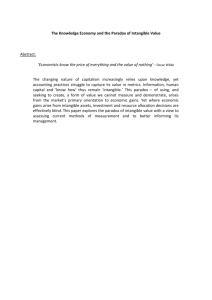Nealon
advertisement
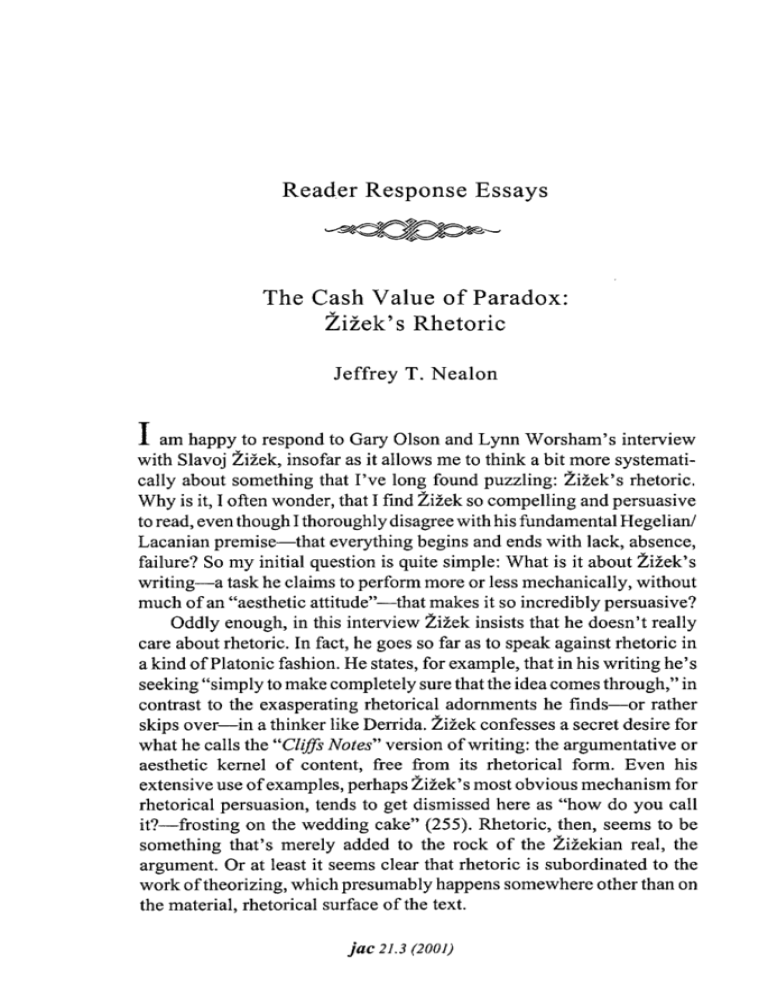
Reader Response Essays The Cash Value of Paradox: Zizek 's Rhetoric Jeffrey T. Nealon I am happy to respond to Gary Olson and Lynn Worsham's interview with Slavoj Zizek, insofar as it allows me to think a bit more systematically about something that I've long found puzzling: Zizek's rhetoric. Why is it, I often wonder, that I find Zizek so compelling and persuasive to read, even though I thoroughly disagree with his fundamental Hegelian/ Lacanian premise-that everything begins and ends with lack, absence, failure? So my initial question is quite simple: What is it about Zizek's writing-a task he claims to perform more or less mechanically, without much of an "aesthetic attitude"-that makes it so incredibly persuasive? Oddly enough, in this interview Zizek insists that he doesn't really care about rhetoric. In fact, he goes so far as to speak against rhetoric in a kind of Platonic fashion. He states, for example, that in his writing he's seeking "simply to make completely sure that the idea comes through," in contrast to the exasperating rhetorical adornments he finds-or rather skips over-in a thinker like Derrida. Zizek confesses a secret desire for what he calls the "Cliffs Notes" version of writing: the argumentative or aesthetic kernel of content, free from its rhetorical form. Even his extensive use of examples, perhaps Zizek's most obvious mechanism for rhetorical persuasion, tends to get dismissed here as "how do you call it?-frosting on the wedding cake" (255). Rhetoric, then, seems to be something that's merely added to the rock of the Zizekian real, the argument. Or at least it seems clear that rhetoric is subordinated to the work of theorizing, which presumably happens somewhere other than on the material, rhetorical surface of the text. jac 21.3 (2001) 600 jac Zizek's ambivalent stance toward rhetoric seems especially odd because he is such a great champion of theorizing "the surface" rather than plumbing the ideological "depths" of thought. But if we are to be "true" to Zizek's statements, we'd have to acknowledge that the "paradox" of his simultaneous deployment and refusal of rhetoric is in fact one of his primary points-a kind of psychoanalytic impasse that we all experience whenever we try to communicate. As he explains toward the end of the interview, communication is "always the communication of a deadlock, that we've established that we have the same problem-not the same solution but the same problem" (274). So, to tum a Zizekian phrase, my failure to immediately apprehend what looks like a paradox in his text is, on further examination, one of the text's primary theoretical "arguments": surface is depth and vice versa. It is paradox all the way down, and this "negative" sense of complication is finally what we share, rather than a more celebratory or "positive" version of linguistic community that we might read in thinkers such as Gadamer or Habermas. We share impasses and problems rather than any number of ideologically suspect positive characteristics like national, ethnic, religious, or intellectual "identity." In other words, one of the paradoxes that Zizek loves so much is evident on the surface of his own text-which says, through a highly rhetorical discourse, that in the end you really don't need rhetoric. Indeed, one of the most recurrent gestures of Zizek's writing is his insistence, in a highly theoretical manner, that you really don't need high theory. While Zizek insists throughout that he's primarily interested in abstract theorizing, paradoxically this is the case precisely because psychoanalytic theory gives us access to the conundrums that structure the everyday. He insists that "we need recourse to psychoanalysis in order to really grasp the paradoxes of consumer culture, commodity fetishism, and so on." He continues, "psychoanalysis is crucial for analyzing how ideology functions ... at the utmost daily level" (257, 258). Zizek does in fact mark this haunting sense of paradoxical reversal in his rhetoric when he notes that friends often point out to him those "turns of phrase that I use all the time. The one I use most often is 'on the contrary' or 'in contrast'; the other one is 'in the first approach it seems to be such and such, but if you look closer you'll see that it's actually something else'" (254). So, true to his Hegelian and Lacanian roots, Zizek's discourse forces us to confront paradox itself as the primary rhetorical and theoretical form of the text and the socius. No easy answers here, and Zizek's principled commitment to complexity is certainly one Reader Response Essays 601 of the reasons for his continuing impact and importance on the contemporary scene. So, to return to my opening question, perhaps Zizek's work is so persuasive because, in old-fashioned terminology, it's "right": the world is a complicated, paradoxical place; so we need tools that work directly on and through complication and paradox-hence the continuing crucial import of psyschoanalysis in demystifying all the illusions of positivist knowledge. Critical questions to such a discourse are a bit difficult to pose. Such a relentlessly paradoxical discourse can always respond that any seeming conundrum within it is further proof of its fundamental premise-the exception, as they say, proves the rule. So, with the full knowledge that my responses can always be sublated at a higher level-with the full knowledge that there is no full knowledge-let me pose a question, or maybe just make a remark. While everything Zizek says about the power of psychoanalysis-its ability to reveal the ideological illusions that we labor under-is quite persuasive, I wonder about the work done by a psychoanalytic emphasis on paradox when it comes to engaging what Zizek identifies as the real target of his intervention: economics. As he polemically holds, "For me, the big problem-and I repeat this in all my recent books-is that the New Left has abandoned the politicization of economics" (276). As the king of the persuasive example (aside from his utterly unconvincing comments on "woman"), Zizek offers contemporary multiculturalism as his primary marker of the turn away from a "politicization of economics": multiculturalism, he argues, "serves to obliterate, to render invisible, what for me are the more fundamental capitalist economic struggles" (278). As he compellingly argues here and in much of his other work, contemporary multiculturalism's false elevation of "the other" tends to elide any kind of substantive engagement (economic or otherwise) with the problems of contemporary globalization: eating Thai food or enjoying the occasional margarita in an "authentic" restaurant hardly constitutes a meaningful engagement with the Other, much less a critique of capitalism. Global capital thrives precisely by aestheticizing difference-by elevating and subsuming otherness-so a simple celebration of other cultures is hardly going to disrupt the work of capitalism. Remember Arby's fast food restaurants, which helpfully remind us that "Different is Good." Or recall the refrain of the pork industry: "It's the other white meat." But just as Zizek questions the easy homology between an aesthetic stance toward the Other and an economic one, in the end I wonder whether 602 jae psychoanalysis, with its relentless emphasis on the paradoxes of subjective desire, is a discourse with the tools-one might say the rhetoric-to deal with contemporary global capitalism. My concern is not with the socalled vulgar Marxist argument that economics is somehow a baseline privileged discourse-one which trumps and determines all others. On the contrary, I wholeheartedly agree with Zizek that there are no reliable depth/surface distinctions of the base/superstructure kind-and even if there are, I side with Zizek on the importance of surface or superstructure. Likewise, I agree with his sense that the crucial political work of theory is performed in its formulation of questions or problems rather than in the ideological work of offering easy solutions. So it is in the service of trying to formulate the contemporary problem or question of economics that I wonder about the psychoanalytic discourse ofparadox, its efficacy in working toward an adequate understanding of the way problems are formulated in our economic moment Despite his insistence on the collapsing of levels in contemporary life, Zizek continues to remain loyal to the project of ideological critique, the project of revealing or demonstrating contradiction: "As a naive Old Leftist, I still believe-and I'll stick with it to my death-that the old Marxist logic of capitalism generating its own contradictions is still relevant" (277). This is certainly a laudable stance, but I wonder whether a commitment to revealing capitalism's "contradictions" doesn't deepen rather than lessen the kind of know-it-all, "been-there-done-that" cynicism that Zizek wants to target Many things about contemporary life seem paradoxical, but what's the cash value of that realization? Let me provide an example. In the interview, Zizek argues that a surface-logic of "fetish" has overtaken the depth-logic of "symptom" in contemporary capitalism: just as there is no simple determining economic "base" to ground the ideological "superstructure," there is no hidden depth of the "real" to recur in a hidden or displaced manner as an individual subject's "symptom. " So, in contrast to the neuro tic Iogi c 0 f the symptom and its hidden cause, the fetish (which is sheer substitution-a shoe for a vagina, a cigar for a penis) comes to the fore in this, the surfaceobsessed world of contemporary capitalism. Money is perhaps the most obvious example here: money doesn't represent anything abstract or produce anything new; in this sense, it's not "symptomatic." Rather, money is "fetishistic" insofar as it's a medium of endless material exchange: it can be traded for cars, toilet paper, cigarettes, whatever. So the contemporary triumph of finance capital-the absolute reign of exchange, of money-brings with it the triumph of the fetish. In our Reader Response Essays 603 era, the base is the superstructure and vice versa; it's fetishism all the way down. Once the logic of the symptom no longer obtains in the social or economic realm, however, I wonder then about the force of "paradox" as any kind of meaningful critique. Let me unpack this a bit. For Freud, the fetishist was something of a hard case, in that fetishists tend on the whole to be quite happy and thus do not come in for treatment. If you've got the shoe or the cigar, you're fine. You've exchanged one thing for another, but the exchange works. It's not that the shoe symptomatically "represents" the vagina for the fetishist; it is the vagina, for all intents and purposes. Freud realized that his payday was never going to come at the expense of the fetishist, but rather in the person of the neurotic-that connoisseur of the symptom who consistently sees his or her irrational behavior as a displaced version of some deep-seated and long-hidden trauma. The symptomatic neurosis of irrational fears or obsessive handwashing, for example, will likely lead a subject to see this behavior as symptomatic and thus to seek help. On the other hand, smoking a dozen cigars a day-fetishistic as that behavior may be-is nowhere near as likely to lead someone to seek psychoanalytic help. And if we do indeed live in an economic fetishist's world of endless surface, I wonder then about the critical efficacy of ideological critique. In other words, ideological critique seems wholly tied to the depth-logic of the symptom, insofar as ideological critique's productive moment is precisely pointing out the "real" or forgotten relation that's "irrationally" displaced in the phantasmatic behavior. Ideological critique depends on a notion of distinct "layers," just as the notion of paradox or contradiction depends on a stable sense of normativity by which its opposite can be recognized. In other words, in a world of pure surface, I don't understand what "paradox" or contradiction means-insofar as paradox seems to imply some normative "real" that's supposed to be in effect, subtending the field. For example, to say, as Zizek does, that the stock market is "irrational" makes little sense to me, presupposing as it does that there is some baseline "rationality" that we all recognize and that we can in tum recognize, for example, that the stock market run of the last decade has violated this rationality in some way. Contemporary capitalism, it seems to me, isn't finally "paradoxical" or "irrational" at all: it has a positive logic all its own, one that's irreducible to the categories of psychoanalysis. Certainly, the logic of the fetish can help explain why individuals or groups seem happy about their own subjection under the reign of money, 604 jac but I think that "paradox" may have to go the way of "symptom" in becoming a thing of the past-insofar as paradox presupposes a kind of normativity or consensus that contemporary global capitalism increasingly renders impossible. In the end, it seems that contemporary capitalism is not so much a theoretical conundrum to be unravelled or understood as it is a mode of command that calls for response. An example? Take "reality television." On one interpretive level, these are shows shot through with "paradox." Survivor and its clone shows (Big Brother, Boot Camp, The Weakest Link) can be dubbed "reality" television only if we're willing to admit that reality has become nothing other than a series of outtakes from an endless corporate training video-with the dictates of 1980s management theory (teamwork, excellence, downsizing) having somehow become "the real." In fact, the exotic, "primitive" physical locations of Survivor argue none too subtly for the naturalization and universalization of these corporate strategies. Survivor seems to suggest that downsizing has somehow become the way of nature. (And this also suggests why Big Brother flopped: no one wants to think about the family living room, the dominant set for that show, as the site for downsizing-it's a little too close to everyday reality.) Survivor's "tribal council" functions simply as a corporate board, demanding regular trimming of the work force until finally the board gets to award a huge executive bonus of one million dollars-with all decisions along the way having been made according to an economist's notion of subjectivity, the "resourceful, evaluative, maximizing" models of human behavior. So much for "entertainment," which here boils down to relaxing after a hard day's work by watching corporate training exercises at night. Discipline during the day, discipline at night. Getting back to Zizek, my question about "reality television" is simple: Is such corporate saturation of entertainment "paradoxical"? Does anybody really believe that television is "entertainment" in the first place? What you see on television, and what you see in much of the economic realm, is not so much a kind of paradox ("it's supposed to be x, but it's really y"); rather, it seems to me that you confront a kind of seamless unfolding of a positive logic: "it's supposed to be x, and, dammit, that's exactly what it is." Or consider the idea that an academic would publish an article based on something he knows little about-a book he hasn't read or a film he hasn't seen. Is this a "paradox," or is it simply business as usual? To sum up, I wonder whether a psychoanalytic notion of "paradox" is strong enough to deal with the contemporary economic questions that Reader Response Essays 605 Zizek finally wants to treat. Insofar as he teaches us that the job of critical discourse is not to offer ideological solutions but "to reject the way the problems are formulated," I offer this question in the spirit of Zizek' sown monumental and important work (282). Pennsylvania State University University Park, Pennsylvania Works Cited Olson, Gary A., and Lynn Worsham. "Slavoj Zizek: Philosopher, Cultural Critic, and Cyber-Communist." JAC 21 (2001): 251-86. Passing on Popular Culture: "Art for Lacan's Sake" Robert Miklitsch Ya gotta love Zizek. Who else would wax enthusiastic-his idea of the "ultimate dream"about wanting to write a volume of Cliffs Notes to a nonexistent text? (Forget about Bix. Borges lives.) Or would brag in print, on record, that he has not seen a lot of the films he has written about? Rossellini? "I haven't seen the films. I tried to, but they are so boring" (270). The above sallies are from Gary Olson and Lynn Worsham's interview with Zizek featured in the last issue of JAC, and they confirm what a lot of us have suspected for some time: that Zizek is not only an intellectual provocateur of the first order but a performance artist, a cross between Kant and Kafka as filtered through the sensibility of Monty Python or, better yet, Firesign Theatre (where the latter "obscure" American inflection is entirely apropos, given Zizek's deep affection for all things American). Zizek, unlike Rossellini, is never boring. On the contrary (to borrow one of his favorite turns of phrase), whether he's discoursing about
